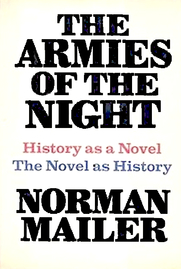A WRITER'S WIT |
My Book World

History as a Novel/The Novel as History. New York: New American Library, 1968.
Almost fifty years after its publication, The Armies of the Night needs no summary. For that you can easily consult Web sources and get a take on its juxtaposition to similar literature of the time period. Nor need I comment much on the author's penchant for referring to himself in the third person. I merely thought it was about time I read some Mailer, and because this tome was recommended to me by friends, I selected Armies. It so clearly limns the times in which I lived as a youth who, except for a certain dumb luck, was spared the agony of being called to serve in the Vietnam War.
Instead, I offer, as usual, what I believe is perhaps the book in a nugget, what the novel is all about—a passage from the chapter, “Why Are We in Vietnam?”:
“Mailer had been going on for years about the diseases of America, its oncoming totalitarianism, its oppressiveness, its smog—he had written so much about the disease he had grown bored with his own voice, weary of his own petulance; the war in Vietnam offered therefore the grim pleasure of confirming his ideas. The disease he had written about existed now in open air: so he pushed further in his thoughts—the paradox of this obscene unjust war is that it provided him new energy—even as it provided new energy to the American soldiers who were fighting it.
“He came at last to the saddest conclusion of them all for it went beyond the war in Vietnam. He had come to decide that the center of America might be insane. The country had been living with a controlled, even fiercely controlled, schizophrenia which had been deepening with the years. Perhaps the point had now been passed. Any man or woman who was devoutly Christian and worked for the American Corporation, had been caught in an unseen vise whose pressure could split their mind from their soul. For the center of Christianity was a mystery, a son of God, and the center of the corporation was a detestation of mystery, a worship of technology. Nothing was more intrinsically opposed to technology than the bleeding heart of Christ. The average American, striving to do his duty, drove further every day into working for Christ, and drove equally further each day in the opposite direction—into working for the absolute computer of the corporation” (188).
“Christians had been able to keep some kind of sanity for centuries while countenancing love against honor, desire versus duty, even charity opposed in the same heart to the lust for power—that was difficult to balance but not impossible. The love of the Mystery of Christ, however, and the love of no Mystery whatsoever, had brought the country to a state of suppressed schizophrenia so deep that the foul brutalities of the war in Vietnam were the only temporary cure possible for the condition—since the expression of brutality offers a definite if temporary relief to the schizophrenic” (188).
NEXT TIME: New Yorker Summer Fiction 2016


 RSS Feed
RSS Feed